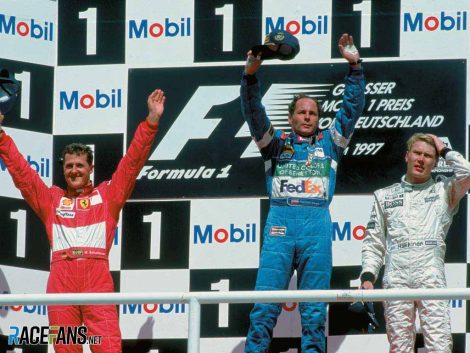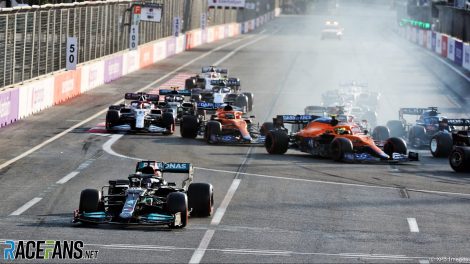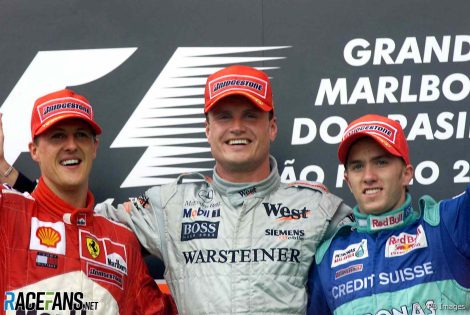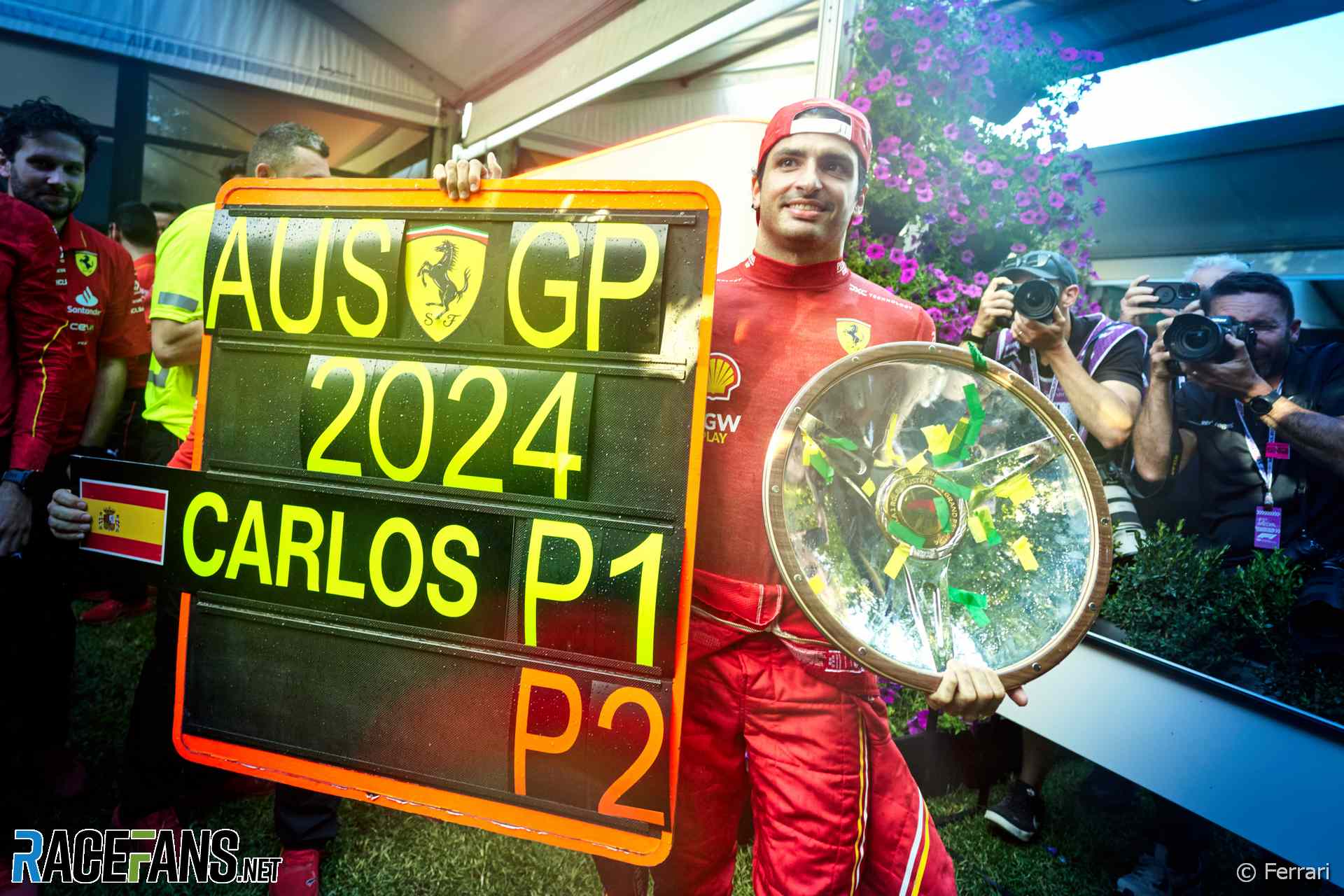Max Verstappen’s changes of equalling the record for most consecutive grand prix wins ended when his right-rear brake caught fire three laps into last weekend’s Australian Grand Prix.
That opened the door for Carlos Sainz Jnr to score a remarkable comeback win, two weeks since he was forced to miss the previous round after undergoing surgery on his appendix.It’s been a long time since a driver missed a race due to illness then won on their return. Among those who’ve come close since are Lewis Hamilton, who didn’t take part in the 2020 Sakhir Grand Prix after contracting Covid-19, but drove to the podium on his return at the next race in Abu Dhabi.
Michael Schumacher could have done it when he returned to racing at the 1999 Malaysian Grand Prix having missed the previous six races with a broken leg. However he was required to help his team mate Eddie Irvine’s championship bid, and gave up a win he could have had, finishing second behind the other Ferrari.

With team mate Charles Leclerc following him home second, this was Ferrari’s first one-two since the 2022 Bahrain Grand Prix, when the pair finished in the opposite order. Ferrari have scored 86 one-twos, 27 more than the next-best team, Mercedes.
Red Bull scored a one-two in the previous race. The last time F1 saw one-twos for two consecutive teams in different rounds was in 2019, when Ferrari filled the top two places in Singapore and Mercedes did the same at the next round in Sochi.
Advert | Become a RaceFans supporter and
Sainz’s win, the third of his career, means he has scored a victory in each of the last three seasons. He now has as many victories as two world champions – Mike Hawthorn and Phil Hill – as well as Peter Collins, Didier Pironi, Thierry Boutsen, Heinz-Harald Frentzen, Johnny Herbert and Giancarlo Fisichella.

Ferrari’s maximum haul of 44 points moves them onto 93, just four behind leaders Red Bull. Mercedes posted their first no-score since the 2021 Azerbaijan Grand Prix, and Haas had both their cars in the points for the first time since Austria 2022.
Verstappen took pole position, the 35th of his career, but didn’t win from there. His last failure to win from pole occured at the 2022 Austrian Grand Prix, where he was beaten by Leclerc. In the intervening period he set pole position 18 times and converted all of those into grand prix victories.
This was Verstappen’s first retirement from a race in two years – his last was also due to a technical failure in the Australian Grand Prix.
Lando Norris joined the Ferrari drivers on the podium, giving McLaren their first appearance on the rostrum this year. This is his 14th appearance on the podium, and he has now beaten the record for most top-three finishes without a grand prix victory:
Advert | Become a RaceFans supporter and
| Driver | Podiums | Team/s | Podium years |
|---|---|---|---|
| Lando Norris | 14 | McLaren | 2020-24 |
| Nick Heidfeld | 13 | Sauber, Williams, BMW Sauber, Renault | 2001-11 |
| Stefan Johansson | 12 | Ferrari, McLaren, Onyx | 1985-89 |
| Chris Amon | 11 | Ferrari, March, Matra | 1967-72 |
| Romain Grosjean | 10 | Lotus | 2012-15 |
| Jean Behra | 9 | Gordini, Maserati, BRM | 1952-58 |
| Eddie Cheever | 9 | Ligier, Renault, Arrows | 1982-89 |
| Martin Brundle | 9 | Benetton, Ligier, McLaren | 1992-95 |
| Luigi Villoresi | 8 | Ferrari | 1951-53 |
| Andrea de Cesaris | 5 | Alfa Romeo, Brabham, Scuderia Italia | 1982-89 |

Yuki Tsunoda scored his first points of the season and the first for RB, the third and latest identity for Red Bull’s second team. Kevin Magnussen also picked up his first points thanks to George Russell’s late crash.
Williams only ran a single car in the race after Alexander Albon’s crash left them with just one chassis. He took over his team mate’s car and finished 11th, as he also did in the previous race.
Over to you
Have you spotted any other interesting stats and facts from the Australian Grand Prix? Share them in the comments.
Become a RaceFans Supporter
RaceFans is run thanks in part to the generous support of its readers. By contributing £1 per month or £12 per year (or the same in whichever currency you use) you can help cover the costs of creating, hosting and developing RaceFans today and in the future.
Become a RaceFans Supporter today and browse the site ad-free. Sign up or find out more via the links below:
Advert | Become a RaceFans supporter and
2024 Australian Grand Prix
- Alonso calls Australian GP penalty a ‘one-off I’ve had too many of’
- Red Bull saw warning sign of Australian GP brake problem on Saturday – Verstappen
- Failing to punish Alonso would have “opened a can of worms” – Russell
- Leclerc sure “many team principals” are pursuing Sainz for 2025 seat
- “Don’t put me under pressure” – The best unheard team radio from Melbourne





Asd
27th March 2024, 8:10
Berger was always fantastic at Hockenheim and it was hard to figure why, especially given the nature of the track.
In 1996 we were about to witness an epic showdown on the final laps between him and Damon Hill when his Renault engine exploded. 1997 gave us a sweet revenge.
Jungle
27th March 2024, 10:50
Think it had something to do with a V12 Asd. Pig on a lot of tracks in 94-95 but at Hockenheim it was poetry in motion…Schumachers Benneton also expired trying to keep up!
Asd
27th March 2024, 12:39
In 1996 there were no V12 engines anymore. Berger drove a Benetton-Renault, and Renaults were the best engines in F1.
Jungle
29th March 2024, 2:08
Misread your years mentioned
José Lopes da Silva
28th March 2024, 16:59
In the past there were some cases of drivers adapting especially good to some tracks, due to the nature of the track and of themselves.
This applied more to midfield-strong drivers, rather than to top drivers, which did not adapt especially to some tracks – top-drivers are all rounders and go fast everywhere, of course.
Later this stop happening or is at least way less visible – surely something to do about the way the sport has evolved technically: simulators, tyre management, etc.
Berger had a serier of seasons (in different teams!) where he was really specially strong at Hockenheim, indeed. I’m not sure if he ever talked about it and it would be a nice question for someone to pose to him. Surely had to do with the way he managed the hard braking and how he came out of the chicanes.
It’s not the same with Ricciardo, who was louded a few years ago as very good in late braking, but now that has vanished. Ricciardo’s eclipse at McLaren still has to be thoroughly explained but I suppose it has to do to the way F1 is depending on simulators and outside technical input.
Damon Hill was quite strong at the Hungaroring, all the way from 1993 to 1997. If it wasn’t for a slow start he would likely have won there in 1996 too.
Jungle
29th March 2024, 2:10
Ricciardo performs well at Mexico
José Lopes da Silva
29th March 2024, 11:23
…good point. Indeed
Qeki (@qeki)
27th March 2024, 8:44
Every year when a team has finished 1-2 in albert park. They have won both of the championships that year.
EffWunFan (@cairnsfella)
27th March 2024, 8:48
@qeki Quick future stat.
Every year when a team has finished 1-2 in albert park. They have won both of the championships that year – up until 2024.
Simon (@donsimoni)
27th March 2024, 16:10
I’ve got another: Zhou will be the second driver in 2024 to miss the podium in his home town.
MichaelN
27th March 2024, 15:46
And if it hadn’t been for 2019, the streak would also have included the winning driver being the eventual champion.
In 1996 it was Hill for Williams, in 1998 Häkkinen for McLaren, in 2000 and 2004 Schumacher for Ferrari, in 2009 Button for Brawn GP, in 2015 Hamilton for Mercedes, in 2016 Rosberg for Mercedes, but in 2019 that ended when Bottas won ahead of Hamilton for Mercedes, with the latter obviously taking the title later that year.
Esploratore (@esploratore1)
27th March 2024, 19:35
There was also a similar stat where whoever won hungary lost the championship, for 15 years or so!
Keith Campbell (@keithedin)
27th March 2024, 9:43
George Russell has crashed out in each of the three races Sainz has won – one first lap crash and two final lap crashes.
bernasaurus (@bernasaurus)
27th March 2024, 11:00
Often with these articles it’s the stuff I learn that has little to do with this week’s race. This time it’s that Eddie Cheever got 9 podiums! A few more than I would have guessed.
Keith Collantine (@keithcollantine)
27th March 2024, 15:40
@bernasaurus My favourite Cheever stat is his last podium came in his home city, Phoenix. Surely a future achievement for Piastri.
Jere (@jerejj)
27th March 2024, 12:31
Max Verstappen’s continuous finishing streak ultimately reached 43 races & consequently, no second consecutive season for him with a 100% finishing record.
Besides George Russell retiring in each of Carlos Sainz’s winning race & on the final lap in the last two of them, other coincidences with the latter two are the Japanese GP following in chronological order, as well as Kevin Magnussen finishing tenth, & no Red Bull Racing driver on the podium.
For the first time in a while, at least, if not ever, a full-time driver replaced his full-time teammate during an event & consequently, Logan Sargeant is still yet to reach the chequered flag in Albert Park.
The second consecutive Australian GP non-finish for George Russell.
Daniel Ricciardo suffered his first-ever Q1 elimination in Melbourne.
The average lap speed reached 250 km/h (250.290 km/h, to be precise) for the first time in Albert Park, which shows how fast-paced the present configuration is, with the track being the outright third-fastest behind only Monza & Jeddah since its return from COVID-induced hiatus.
The first Australian GP since 2013, with two Aussie drivers participating simultaneously.
Because of getting withdrawn from the event, Logan Sargeant wasn’t the driver to arrive on the grid last within the 10-minute pre-race reconnaissance period as he’s done for most races in his thus far short F1 career.
The first Australian GP podium appearance for McLaren since the first hybrid-era race.
The second consecutive Australian GP to end under neutralized conditions.
Simon
27th March 2024, 16:43
Source? Credit?
Of course not – at least someone else here credits the original source
Esploratore (@esploratore1)
27th March 2024, 19:39
Which of the 2 comments do you think belongs the least on the website? One who says plenty of stats or one who criticizes for reasons like that?
Esploratore (@esploratore1)
27th March 2024, 20:02
I like the sainz win, russell retires stat, I actually was aware of that but didn’t think about it, in both cases merc had bad strategic decisions, giving up track position for newer tyres and it backfired in both cases, and for ricciardo it’s a shame he never got a podium in australia, he had the potential to do that with red bull and got 4th in 2018, and in the end red bull looked faster than ferrari but couldn’t overtake raikkonen.
roadrunner (@roadrunner)
27th March 2024, 15:38
“Leclerc denied Sainz the fastest lap, taking the third of his career”
That’s a pretty shocking stat and pretty much sums up Ferraris deficit in race pace over the years.
But he scored flap last race too.
So just one other in all his seasons with Ferrari, that’s hard to believe…
MichaelN
27th March 2024, 15:49
That’s not correct; Leclerc has 9 fastest laps, all of which with Ferrari; 4 in 2019, 3 in 2022 and now 2 in 2024.
While it’s certainly true that Ferrari has had worse race pace compared to some of their direct rivals, the fastest laps have become a bit of a gimmick in recent years, so it’s hard to draw too many conclusions. Last year no fewer than 9 drivers had a fastest lap at some point, including Zhou and Tsunoda, with Verstappen taking the most but ‘only’ 9.
roadrunner (@roadrunner)
27th March 2024, 16:43
Thanks for looking it up. 9 make more sense while still relatively low.
I know it’s become a gimmick, but even Ferrari should be capable of at least sometimes challenge for it too.
Interestingly last year of the nine driver you mentioned none of them drove for Ferrari.
Jonathan Parkin
27th March 2024, 19:39
Although it is possible to be champion without a fastest lap. Four drivers have done it, Graham Hill (1968), Emerson Fittipaldi (x2), Jody Scheckter and Keke Rosberg
Esploratore (@esploratore1)
27th March 2024, 20:34
Rosberg also got close to winning the title without a win, taking a single one, and it’s theoretically possible by a very consistent driver and with better reliability, as long as several other drivers split the wins between each other.
Keith Collantine (@keithcollantine)
27th March 2024, 17:06
Sorry error by me there – it was his ninth.
invincibleisaac2000
27th March 2024, 16:04
Only the second time since Spa 2012 that the podium featured no Red Bull or Mercedes drivers! The other occassion was Sakhir 2020
invincibleisaac2000
27th March 2024, 16:11
Hang on, that’s not right … think it might be the 4th non MERC/Red Bull podium since Hungary 2012?
Esploratore (@esploratore1)
27th March 2024, 20:36
Speaks highly of their competitiveness!
MichaelN
27th March 2024, 16:07
Schumacher’s record of 100% podium finishes in a season will not be matched this year, with nobody scoring a podium in all three races thus far (Verstappen, Pérez, Leclerc and Sainz each have 2 out of 3).
Red Bull is close to hitting 100 pole positions, now at 98. Ferrari leads the ranking with 249 poles. Either one is a pretty cool milestone.
Ferrari tellingly only scored 7 one-two’s since their last title winning year in 2008. It was the second time Sainz and Leclerc shared a one-two, with Leclerc winning in the 2022 Bahrain race. Vettel and Räikkönen also shared two one-twos, as did Alonso and Massa, in both cases the former won both times. Vettel and Leclerc shared a single one-two, in Singapore 2019.
Verstappen’s brief stint at the front means he has now led 80 Grand Prix, putting him 8th in the overall ranking. He has been stuck in 8th for a while after besting Coulthard’s 62 races, but is likely to make a big jump this year as ahead of him are Räikkönen (83), Prost (84), Senna (86) and Alonso (87). After that there are further big gaps to Vettel (107), to Schumacher (142) and to Hamilton (182). It’s actually pretty surprising he’ll have to lead over 20 races each year for the next five years to get close to Hamilton.
PlosslF1
27th March 2024, 18:24
“sinus infection and returned at the Hockenheimring where he blew the competition away”
I see what you did there Keith ;)
Esploratore (@esploratore1)
27th March 2024, 20:39
Ahah, that’s a good one indeed.
Mooa42
27th March 2024, 22:51
Certainly nothing to sneeze at.
paulgilb (@paulgilb)
27th March 2024, 22:34
Both Vettel and Verstappen have seen runs of 9 consecutive victories come to an end in an Australian GP in a year ending in 4 in which neither they nor Hamilton have finished and a McLaren finished on the podium.
First time Sainz has officially been classified higher than 8th in Melbourne, and his first points at the circuit since 2018.
First race to be won by a driver who had not started the previous race since Alonso in France 2005 (unless I am mistaken).
Still no Australian driver has officially managed a top 3 finish in Australia.
Second consecutive year in which Perez has finished 5th in Australia having been part of a Red Bull 1-2 in the first two races.
First no-score for Mercedes since Azerbaijan 2021. This equals their 62-race streak from Brazil 2012 to Russia 2016. The record is Ferrari, with 81 between 2010 and 2014. Red Bull now have the longest unbroken streak with 46 (last no-score was Bahrain 2022).
Hulkenberg has scored points in 7 of his last 8 Australian GPs – the only exception was 11th-place in 2017.
First time Verstappen has started on pole but not won since Austria 2022 – which was also the previous time that both Haas drivers scored.
Only the second time (after Italy 2021) in which both Hamilton and Verstappen have taken part in the race but failed to finish.
Leclerc keeps alive his run of at least one top 2 finish every season since joining Ferrari.
Sainz has passed 1000 career points.
Norris keeps alive his runs of at least one top 3 start and at least one podium every season since 2020.
Verstappen’s first no-score since Australia 2022 – Hamilton’s record streak of 48 is thus preserved for the time being. Alonso and Perez currently have the longest unbroken scoring streaks (6, last no score was Mexico City 2023), although Leclerc has scored in the last 12 F1 weekends (inc sprints – last no score was Netherlands 2023).
Ricciardo has the longest unbroken run of finishes (8, all races since his non-appearance in Qatar 2023), and Hulkenberg has the longest unbroken run of classified finishes (16, last non-classification was Austria 2023).
First time since Qatar 2023 that Leclerc has not qualified on the front row.
44th consecutive season in which at least one British driver has finished on the podium – extends their current record.
Thanks to statsf1 and the official F1 site for some of these.